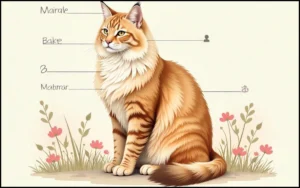Can Cats Taste Spice? The Truth About Spicy Foods & Your Cat

Too Spicy to Handle? Why Cats Get Confused by Heat
Cats are evidently curious creatures, frequently displaying interest in their proprietors’ food. However, when it comes to spicy ingredients, their reactions can be pretty exceptional from people. Whilst we experience a fiery kick from capsaicin, the energetic compound in chilli peppers, cats lack the necessary receptors to perceive this warmth. This indicates they don’t experience the equal burning sensation that we do.
Table of Contents
Why Cats React Differently to Spicy Food
Even though cats do not feel the “warmness” of spicy meals, that does not mean they may be unaffected. Spicy ingredients can purpose infection in their mouth, throat, and stomach. A cat might probably paw at their face, drool excessively, or maybe sneeze on the occasion that they get too close to strong spices. Furthermore, the stinky aroma of spices may be overwhelming to their touchy noses.
Is Spice Exciting or Dangerous for Your Cat?
The strong odour of spices would possibly intrigue your cat, but that doesn’t mean it’s secure for them to devour. In reality, many highly spiced ingredients can pose extreme dangers to feline health.
The Risk Factors of Spicy Food for Cats
Exceptionally spiced meals regularly comprise onions, garlic, and salt, which may be poisonous to cats. Even small portions can motivate digestive issues, vomiting, diarrhoea, and dehydration. Additionally, the oils and seasonings in surprisingly spicy dishes can also disenchant their touchy stomachs, leading to extended soreness.
Why Spicy Foods and Cats Don’t Mix
Even as cats can be tempted to sample your highly spiced meal, allowing them to consume it isn’t really useful. In contrast to people, cats have evolved to thrive on a carnivorous diet, meaning their digestive systems aren’t designed to method spices and seasonings.
What Happens When Cats Eat Spicy Food?
If a cat eats specially spiced food, they may enjoy excessive drooling, vomiting, diarrhoea, and belly pain. Some cats may moreover even enlarge a moderate allergic reaction, resulting in itching or swelling. Extended publicity to spices can cause persistent gastrointestinal issues.
From Drooling to an Upset Stomach: The Side Effects of Spice
Cats that accidentally consume spicy food may start drooling, rubbing their faces, or appearing restless. Some may refuse to eat their regular food afterward due to stomach discomfort. If symptoms persist for more than a few hours, veterinary intervention may be necessary.
What Vets Say About Giving Spicy Food to Cats
Veterinarians strongly discourage feeding highly spiced meals to cats. Seeing that their digestive structures are designed for protein-wealthy diets, introducing spicy elements can cause irritation and lengthy-term fitness problems. If your cat eats spicy meals by chance, display them for any signs of misery and consult your vet if wanted.
Can Cats Even Taste Spicy Food?
Cats have far fewer taste buds than humans, meaning their ability to detect complex flavours like spices is extremely limited.
Do Cats Feel Spicy Heat Like We Do?
Unlike human beings, cats lack the TRPV1 receptor that detects capsaicin, the compound chargeable for the warmth in highly spiced ingredients. This indicates they don’t perceive spiciness as a burning sensation. But this doesn’t imply they need to eat spicy food—other elements can still purpose harm.
Spice or Sensory Overload? How Cats React to Heat
Although cats don’t taste spice the way we do, the strong smells can overwhelm their senses. Many cats will react by backing away or sneezing if they get too close to spicy dishes.
Your Cat’s Tongue Says ‘No Thanks’—Here’ ’s Why
A cat’s flavour buds are specifically designed to stumble on proteins and amino acids, not spices. With the simplest round 470 flavour buds as compared to a human’s 9,000, their capacity to experience complicated flavours like spice is in reality nonexistent.
Spicy Food Myths: Do Cats Actually Like It?
Many pet owners expect that if their cat licks or eats something highly spiced, they need to like it. But this is usually a false impression of pussycat conduct.
The Chilli Confusion: Are Cats Attracted to Spice?
Cats can be interested in the scent of spicy food because it includes meat or fats, no longer because they revel in the spice itself. The wealthy aroma of cooked meat and oil-based seasonings can be engaging, but the real spice can cause discomfort.
Pepper Problems: Common Misconceptions About Cats and Spicy Foods
One common myth is that cats enjoy spicy food because they seem interested in it. However, their curiosity is more likely driven by the scent rather than the taste.
The Truth About Cats and Spicy Food—What You Need to Know
If your cat suggests a hobby in spicy food, it is satisfactory to preserve them far away from it. Although they don’t perceive the warmth, the elements can nonetheless cause fitness issues.
Why Your Cat Tries to Eat Spicy Food (And Why That’s a Problem)
Many cats try to sneak bites of human food, including spicy dishes, out of curiosity. However, indulging in these foods can be risky.
Your Cat’s Super Nose: Why Smell Makes Them Curious
Cats rely on their sense of smell more than taste. The strong aroma of spicy food may intrigue them, making them want to investigate further.
From Sniffing to Eating—When Interest Turns Risky
A cat might lick or nibble highly spiced meals out of curiosity; however, ingesting an excessive amount can result in digestive distress. Preserving highly spiced meals out of reach is the nice way to prevent unintended ingestion.
How to Keep Your Cat Away from Spicy Food
To prevent your cat from consuming highly spiced foods, shop for your food securely, remove leftovers well, and offer them cat-secure treats alternatively.
The Health Risks of Spicy Food for Cats
Highly spiced ingredients can cause a spread of fitness troubles for cats, starting from slight inflammation to critical toxicity.
Spicy Foods Can Burn Your Cat’s Mouth—Here’s Why
Capsaicin can cause irritation and burning sensations in a cat’s mouth, although they don’t experience the heat in the same manner we do. This could result in soreness, excessive drooling, and infection of the throat.
Upset Stomach and Long-Term Issues from Spicy Foods
Even small quantities of highly spiced meals can lead to belly disillusionment, diarrhoea, and vomiting. Ordinary exposure may also bring about persistent digestive troubles or meal aversions.
Final Thoughts
Even as your cat can be interested in spicy meals, it’s first-rate to preserve them far away from it. Their digestive systems are not designed to deal with spices, and consuming them can result in pain or extreme fitness issues. As an alternative, provide them secure and nutritious alternatives to keep them satisfied and healthful. In case your cat by chance ingests spicy food, display their reaction and consult a veterinarian if important.







